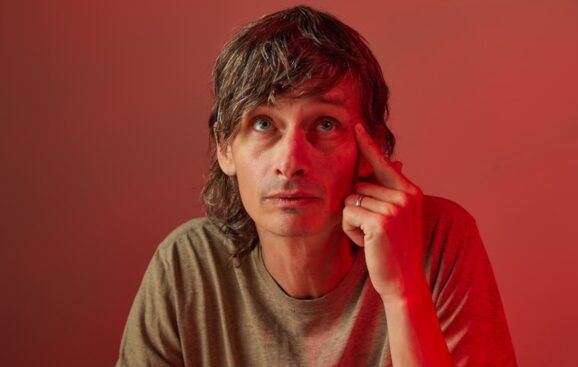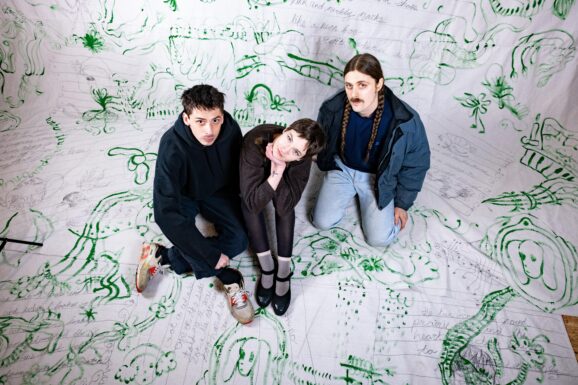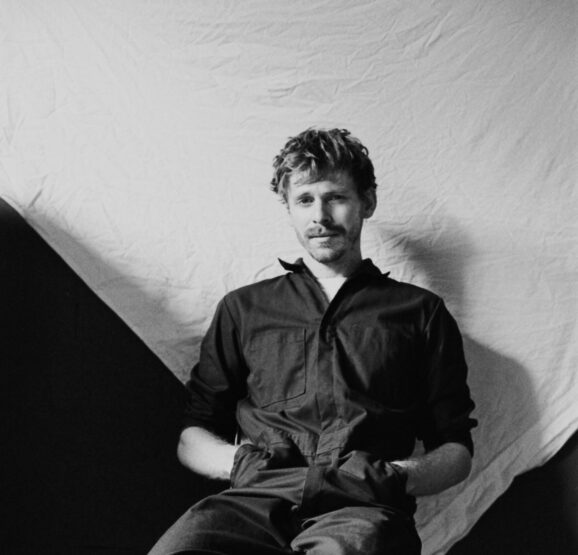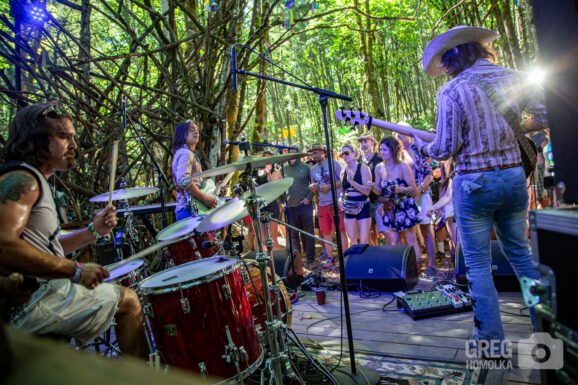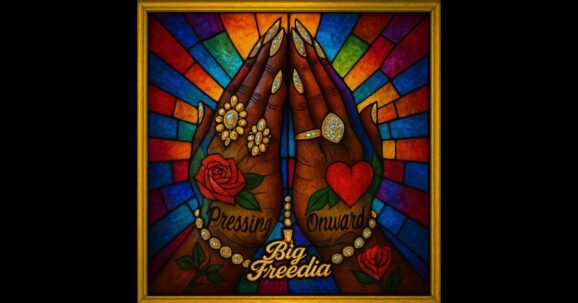Chestnut Grove is a Philadelphia-based multi-genre Rock band who have been playing together for 12 years, and they recently released their album Can’t Stand The Music. The release followed a ‘Ta-Ta For Now’ tour where the band pulled out all the stops for some mega shows, including big hometown celebrations to finish things off. As the name of the tour might suggest, there is some uncertainty about the band’s future as lineups are in flux. The irony is not lost on the band that Can’t Stand The Music is their most musically accomplished and cohesive album so far, which fuels their hopes that there will still be a future for Chestnut Grove.
Affected as we all were by the pandemic period, Chestnut Grove was hit particularly hard because of their live performance identity, and the miles that they’d put on their live show became a big source of growth and development for them as songwriters, as much as musicians. Finding such a standstill to live music shocking, they nevertheless found themselves writing music in a whole new way that broadened their sound, embracing a big build-out alongside closer collaboration. I spoke with founding members Dee Gerhart and James Daniels about the uncertain times that still led them to an even more rewarding creative space that resulted in Can’t Stand The Music.
Hannah Means-Shannon: I know you went on a very full tour ahead of the album release of Can’t Stand the Music. Did you nevertheless play some of it live?
James Daniels: The second week of the ‘Ta Ta For Now’ Tour, it was actually available just on our website, since we knew how long it would take to get it on streaming sites. We wanted just our die-hard fans to have a chance to hear it and then to hear it played live. That was the idea.
I think that was a great idea. It’s very unconventional in some ways.
Dee Gerhart: We’re very unconventional in a lot of ways.
James: Probably one of the most unconventional bands, starting with Dee and I! [Laughter]
It reminds me a little of They Might Be Giants who did stuff like Dial-a-Phone where if you phoned a number, you could hear their new music. You could hear it!
Dee: That would be fun!
James: You have to do something different. There wasn’t really a gimmick or scheme behind it, we just did it out of necessity.
Dee: We released this album unconventionally, too, in the sense that five of the album’s songs have been singles that we’ve released between 2022 and now.
That’s keeping one foot in each camp because it allows for the world of singles as well as for the album. You also released an EP that led up to the album, right?
James: There was a Can’t Stand The Music EP that came first, yes. It was a physical EP but on Spotify it was five separate singles.
Basically, you hit all of the bases by doing that, and that’s becoming a lot more common as a roll-out choice.
James: Well, the ‘Ta-Ta For Now’ tour, and rolling things out this way has gotten us more attention than we ever had as a band before. Dee and I don’t really have an interest in this being the end for the band, but we don’t really have a full band right now, so that’s going to take some time to figure out. It’s all working in our favor to some extent!
Did you all do a Kickstarter for this album?
Dee: We did. I don’t think we had done anything involving crowdfunding since 2017.
James: We had tried to get away from crowdfunding as much as we could and make our money from touring and selling merch, but with the Covid situation, we were left with no money from tours.
Dee: So we ran a Kickstarter and it exceeded its goal.
James: Our fans did their job!
Kickstarter is a lot of work all around, but it’s great when it saves the day. Needless to say many bands were really affected by the lack of funds from touring which impacted whether albums could be made. Live playing is such a huge part of your identity. Was it a dead-water time for you?
Dee: I’m pretty sure that we all felt in shock because live shows have been and are our main drive. That’s kind of the point, I’d say. But we did our best to shift to social media.
James: We probably should have taken advantage of that more, but I was so disconnected from myself during that time. I’m sure that hundreds of millions of people felt disconnected from themselves during that time. I was unfocused and I had always been very driven to be on tour, book shows, and be on the road. I actually enjoyed thinking about the business side. I don’t fear that side of things. Some artists don’t want to deal with that stuff, but I even enjoy that side of things. But at that time, I wasn’t mentally prepared because of my inability to do things that made sense to me.
Of course, I agreed with the need for lockdowns, but I had always been in control of Chestnut Grove’s destiny, and at that time I didn’t know what to do. We also didn’t have the technology to put out livestreams that I would have been comfortable with, unfortunately.
Dee: But we did write!
James: We wrote the best music that we had ever made.
Dee: The track “Can’t Stand The Music” was written on electronic drums in my room.
James: That one was written in a really different way, starting with the electronic drum…
Dee: And a whiteboard.
James: It sounded very 80s. That was something we had never touched upon. I think we heard that sound and kind of ran with it. I got really into The Talking Heads during Covid.
Dee: That was a good thing! Stop Making Sense was on repeat.
James: Stop Making Sense was even the inspiration for the title, kind of. There’s a similar feeling to the statement, relating to the industry, that Can’t Stand The Music was the state of the industry and the state of the world.
Nice! That’s so cool. I hadn’t thought about that aspect of it. I was thinking more about gentrification or the closing of clubs and venues. Maybe I was also thinking about the idea of this bigger cultural idea of making money driving out the experience of live music, so I guess that does connect to the industry. The fact that live music is, instead, about being in the moment and connecting.
James: I think you’re right on the money with that. “Can’t Stand the Music” was written in different verses together.
Dee: There was a lot of just yelling things out and writing them on a white board. And then we put those things together.
James: When we’re singing or playing that song, what’s going on in my head is the internal struggle of the artist when you’re making records, trying to sell tickets to clubs, and making a living playing music. There’s a line, “another rich in a suit trying to take it from me” is the other person on your shoulder. There’s a stockbroker and hippie arguing with each other, rather than a devil and an angel, about how to be artistic. The larger way I interpret the song is that it is about whether you want to be an artist or a business person. Being in a band nowadays, you struggle with that. I’m sure it’s always been like that, but artists on all levels, whether they are The Black Keys, or a little Philly band, have said things like this recently.
Dee: For me, that song is also about the question: How much control, as an artist, do you have? Like in the phrase, “Can’t stand the music, can’t stop the rain…” But you can feel your heartbeat. You have the drive, but how much control do you have?
Yes, the powerlessness of that. I was thinking about that, too, wondering: What is power? What is powerlessness? The irony or message of the song is that the song itself goes on. It goes forward, and the music is very enveloping. It’s mantra-like and silences all the other concerns. That’s a great statement. And as you said, it brings in new sounds that you hadn’t really explored as a band.
James: I was living with our bass player, Zach [Winkler], at the time Covid started, so we were writing in new ways and I’d never written that way before. I would usually write on an acoustic guitar. Circumstances worked out, and me being a drummer, I could write with the bass player. That drove some new options for sound that I actually think were driven toward Dee. I wanted to get away from my folky style and show what Dee can do on stage, what we can do with our two great guitar players. I’m wilder as a drummer than a singer/songwriter. Writing with our bass player helped make that all possible.
Did that musical direction influence the direction of the other songs that you wrote for the album afterward? I’m looking at the song “All For You” and I think there are some sound relationships with “Can’t Stand The Music.”
Dee: Yes, the two songs are very connected. The idea was to explore having a bigger sound. We knew we’d had it on a few songs in the past, but we’d dance around it a bit, asking, “Are we minimalist?” We kind of just gave into it, to have a bigger sound. We grew up together and go see a bunch of bands together. A band like My Morning Jacket, or even The Killers, would have such a big, choreographed show, and I was attracted to that. I wanted to push that direction for Chestnut Grove. I wanted to create a record that would intertwine with our live show and make a big sound.
“All For You” has that connection to “Can’t Stand The Music”, but of course it’s more relaxed, and has that mellowness that’s pretty cool.
Dee: I think overall, those two songs are more related than the rest of them because we used synth settings that were similar on those tracks. We kind of kept that soundscape.
James: Dee plays guitar, keys, and drums, and our guitar player John [Tyler Plasterer] has a great musical mind.
Dee: He’s like the mathematician behind things.
James: He takes what Dee and I come up with and then does a lot of chord exploration. John kind of morphed into our keyboard player, utility, and guitar guy, and I think that benefitted our sound. We started to lean more into…
Dee: The ethereal.
There’s definitely a lot of atmosphere.
James: I was always into atmospheric music. I love Radiohead and My Morning Jacket. I think that Talking Heads is very atmospheric even though it is very R&B in its New Wave aesthetic.
Dee: We went into lots of different types of harmonies on this record, as opposed to our other ones, too. That lent to the etherealness of it.
James: I agree. I consciously wanted to get away from the feeling that you could pick out on our earlier records of “That’s a Dee song.” Or “That’s a James song.” I wanted to get away from the separation and make the album more of a cohesive thing, and I think the natural answer to that was to use our harmonies and use our arrangements together. Everyone in the band had a voice that we could use, so we started adapting to that style of things. That is one thing I’m really proud of about this record that I think we accomplished.
Dee: Same. If anything, that is what drove this entire record. From a writing perspective, it was very collective. It wasn’t a lone perspective.
James: The song wouldn’t be brought in, already done. Every song idea, in its infancy, was about getting it to a stage where they all could fit together on this record together.

